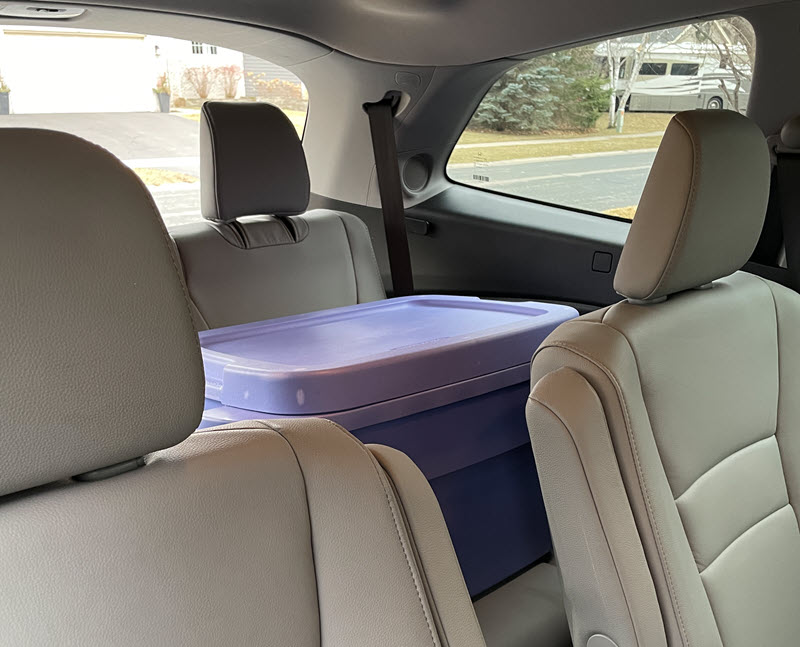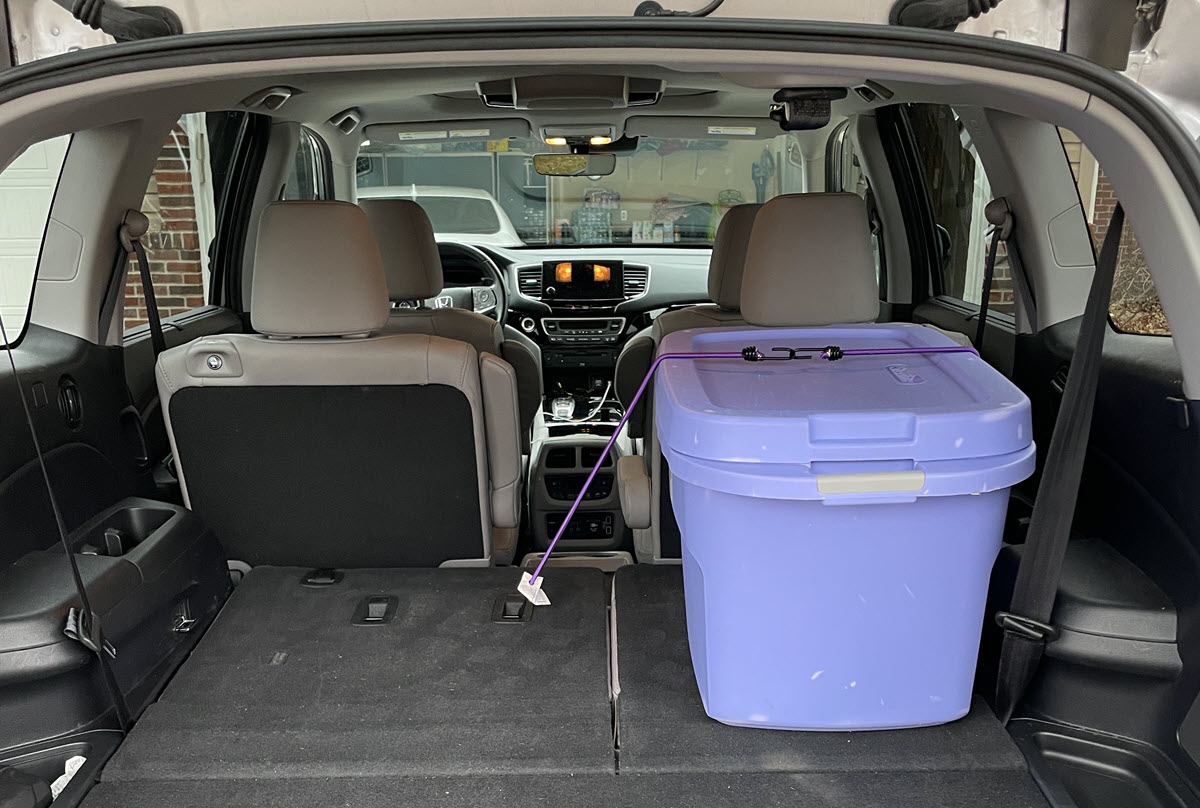We’re often asked, “Can I put stuff in my car when I ship it?” Shipping a car with personal items has always been a hot topic.
We get it. It’s so tempting to want to take advantage of all that space in your vehicle and load it up with personal belongings. It’s so much easier to ship your personal items and household goods that way, right?
We totally understand the thinking, but there are some important things you need to know about shipping a car with personal belongings. There are some very real risks and legalities you need to be aware of before you go down that road.
Theft, damage, insurance issues, and delays in your auto transport are just some of the potential pitfalls and risks that you may face when shipping your vehicle with personal items and household goods. Let’s take a closer look at these.
Theft & Damage
The first thing you need to know is that if any household goods and personal belongings that you ship with your vehicle are lost, stolen, or damaged they will not be covered by the carrier’s cargo insurance. You ship them at your own risk!
You may think that just because your vehicle is on a carrier’s trailer, it’s safe from potential theft. We wish that were true, but the reality is theft is always possible. If a thief happens to stroll by your vehicle while the driver is inside a gas station taking a bathroom break, and he notices valuables inside your vehicle, they could be stolen.
We had a customer that had one of those built in toolboxes in the bed of his truck. Despite our repeated warnings, he insisted it was safe to ship his truck with the toolbox loaded with over $2,000 worth of tools.
Guess what happened? That’s right. Despite having a hefty lock on it, his toolbox was broken into, and every tool was stolen. Fortunately, his personal auto insurance covered his loss, but it was a major headache for him to deal with.
The other risk you need to consider is the potential damage that can occur to your vehicle because of the household goods or personal items that are shipped with your vehicle. If those items are banging around or rolling around in the inside of your vehicle and they cause damage to your vehicle, that damage will not be covered by the carrier’s cargo insurance. Likewise, if a thief smashes your window to get to your belongings, that damage won’t be covered.
Legal Issues & Industry Regulations
The Department of Transportation (DOT) has clear regulations regarding the transportation of vehicles with personal belongings. If a carrier isn’t licensed to ship household goods and personal items, they could technically be fined thousands of dollars.
And here’s the real kicker, almost all auto carriers on the road today are NOT licensed to ship household goods and personal items. They are only licensed to ship vehicles. Now the reality is, the law is rarely enforced but that could change.
The other issue with shipping a car with personal items is the weight these items add to the vehicle. The D.O.T. has strict weight limits that carriers must adhere to. Unlike the law regarding the licensing of shipping households good and personal items that is rarely enforced, the weight limits set by the D.O.T. are strictly enforced.
Exceeding these weight limits can lead to violations, fines, inspections, and delays for the carrier. It is for this reason that carriers are very particular about the personal belongings that are shipped with vehicles and how much they weigh.
Police Inspections
Yes, police inspections are a very real possibility. Granted, they are rare, but they can (and do) happen occasionally. Here is a photo a driver sent us not too long ago of the vehicles on his trailer being inspected.

Notice where those police officers are looking? That’s right, in the trunk! People always assume that if they keep their personal belongings in the trunk they will be completely hidden and safe from prying eyes. Not so. The police have the legal authority to search the entire vehicle when it’s being transported because it’s considered cargo.
The police aren’t going to confiscate that PlayStation and box of games you have packed in the trunk, but do you really want the police rummaging through your things? And don’t forget about the delays in your transport because of these inspections. This particular carrier had a full load of vehicles, and the police inspected every vehicle thoroughly. It took a long time!
4 Important Tips When Shipping a Car with Personal Items
If you haven’t figured it out by now, we’re not huge fans of customers shipping their vehicles with personal items and household goods because of the risks and legalities involved, but if they insist, they must adhere to our personal belongings policy.
In addition, we tell them to keep these four tips in mind:
1. The 100 Pound Rule. Because of the strict weight limits that carriers must adhere to, 100 pounds is the typical upper limit allowed for personal items. If you look through the personal belongings policy on just about every carrier’s or broker’s website, including our own, you’ll notice 100 pounds is the common limit. Some will allow higher limits, but they do so with increased risk, and they’ll charge you extra for it.
2. Secure and Conceal. Personal items should be securely packed and concealed within the vehicle to prevent them from shifting during the transport, and to prevent them from being seen. A suitcase, duffle bag, tote, or cardboard box can be used to secure and conceal personal items and to prevent them from moving around inside the vehicle.
3. Out of Sight, Below the Window Line. To deter theft and ensure driver safety when loading and unloading the vehicle on the trailer, personal items must be stored securely in the trunk, cargo area, or far back seat of the vehicle and below the window line. Here is an example of a customer that shipped a vehicle with personal belongings perfectly:

You can’t tell from the photo, but the back windows of the SUV were fully tinted so you couldn’t see through them from the outside. You’ll notice the personal items were secured in one tote in the back of the vehicle below the window line.
4. Exercise Common Sense: When shipping stuff with your car, use common sense. If your personal belongings are highly valuable or sentimental and not easily replaced, then don’t ship them with your vehicle! Remember, personal items are not covered by cargo insurance.
Final Words on Shipping a Car with Personal Items
We understand it’s a hassle to ship personal items and household goods separately from your vehicle. It’s not fun packing them all up and dragging them to your local UPS or FedEx store, but it’s really the best option. They’ll be fully insured, and they’ll get to their destination quickly and safely. And here’s the other thing, it’s not that much more to ship them with UPS or FedEx than what a carrier would charge you to ship them with your vehicle.
We, like all other carriers and brokers, are AUTO shippers. We aren’t UPS or FedEx. We don’t ship personal belongings. Technically, we’re not even licensed to do so! Let us do what we do best and what we’re licensed to do – ship automobiles. Leave the shipping of personal items and household goods to UPS and FedEx.

